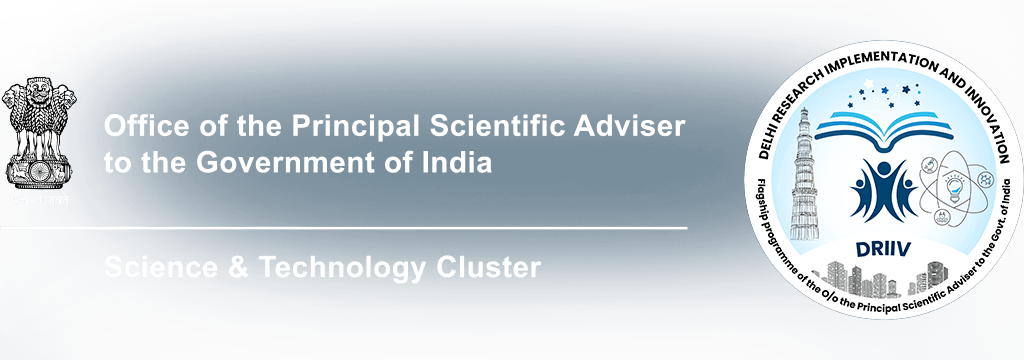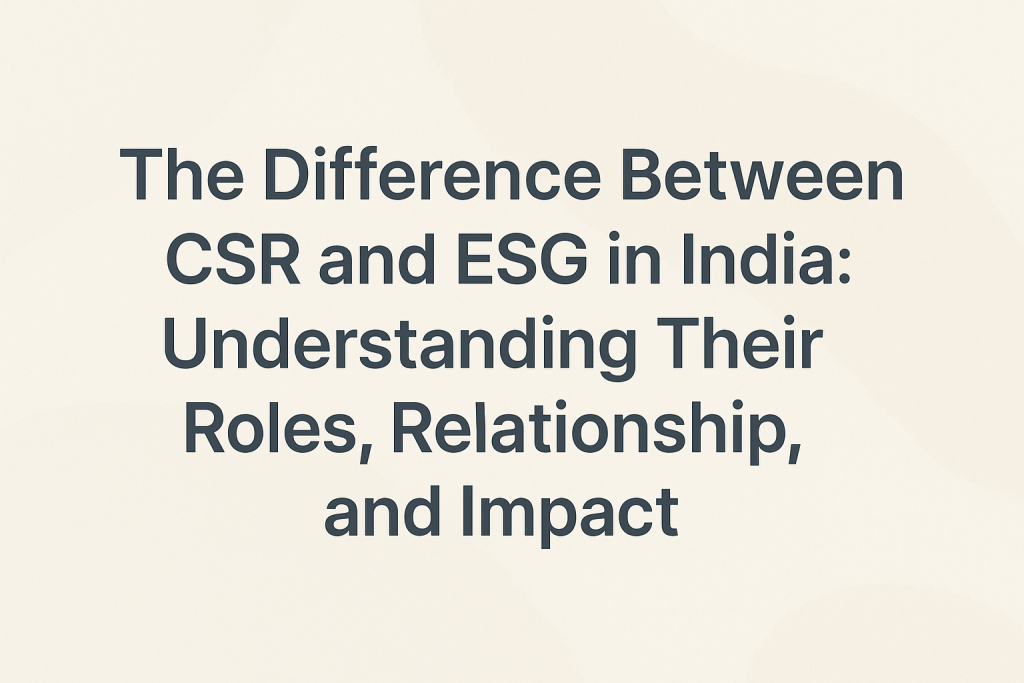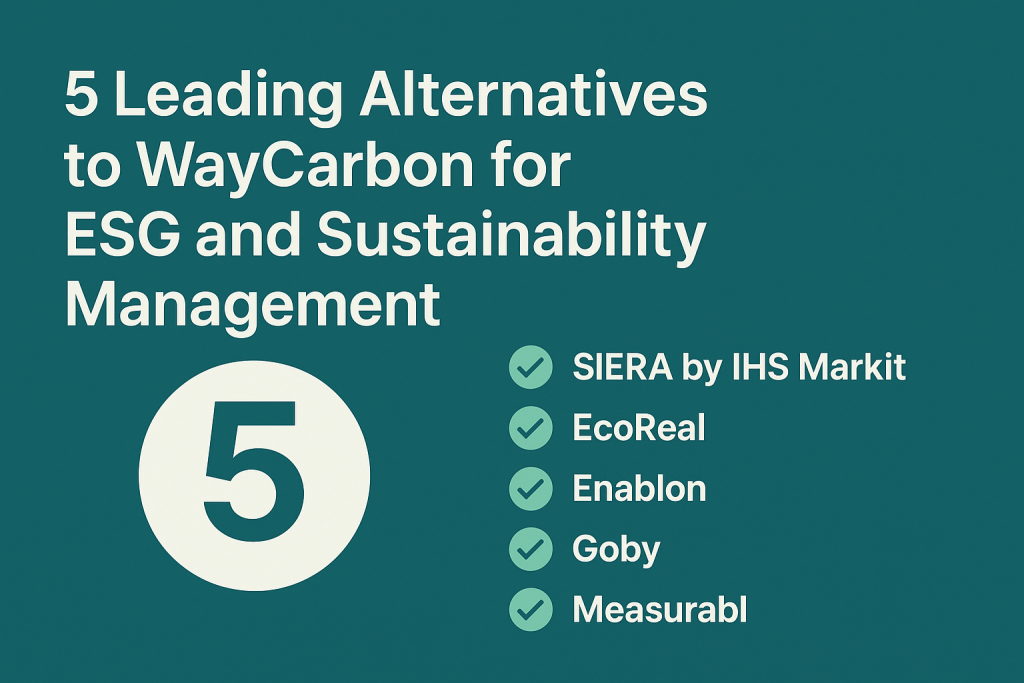In recent years, terms like CSR (Corporate Social Responsibility), ESG (Environmental, Social, and Governance), and Sustainability have become important in the world of business and social responsibility. Many companies in India are now focusing on their role in the environment and society. But the terms CSR and ESG are often used interchangeably, even though they are not the same.
In this blog, we will explore the difference between CSR and ESG in India, the relation between CSR and ESG, and how CSR vs ESG vs sustainability are connected but distinct.
What is CSR?
CSR (Corporate Social Responsibility) is a business approach where companies take responsibility for their impact on society and the environment. In India, CSR is not just voluntary—it is a legal requirement for certain companies.
Under the Companies Act 2013, any company in India with a net worth of ₹500 crore or more, or a turnover of ₹1,000 crore or more, or a net profit of ₹5 crore or more, must spend 2% of their average net profits from the last three years on CSR activities.
CSR activities in India usually focus on:
- Education
- Healthcare
- Environmental sustainability
- Rural development
- Skill development
- Gender equality
These projects are usually philanthropic, meaning they are focused on doing good for the community without expecting financial returns.
What is ESG?
ESG (Environmental, Social, and Governance) is a set of standards that investors use to evaluate how responsible and sustainable a company is in the long term. ESG is more data-driven and is used for measuring a company’s performance in non-financial areas.
Here’s a breakdown of ESG:
Environmental: How a company impacts nature—carbon emissions, waste management, energy use, water conservation, etc.
Social: How a company treats employees, communities, and society—diversity, employee rights, human rights, and health and safety.
Governance: How a company is run—board diversity, transparency, ethics, and anti-corruption practices.
Unlike CSR, ESG is not only about doing good. It is about integrating responsible practices into the company’s core operations, risk management, and long-term value creation.
The Difference Between CSR and ESG in India
Understanding the difference between CSR and ESG in India is important for companies, investors, and the general public.
Feature CSR ESG
- Legal Requirement Mandatory for eligible Indian companies under Companies Act Not legally mandatory, but strongly encouraged by regulators like SEBI
- Focus Philanthropy and social good Business risks, sustainability, and investor expectations
- Reporting CSR spending must be reported annually ESG disclosures are becoming essential for listed companies
- Scope Mostly external social initiatives Covers internal operations and external impact
- Motivation Compliance and moral obligation Strategic business and risk management
- In short, CSR in India is often project-based and charity-oriented. ESG, on the other hand, is a broader business strategy that looks at how a company creates long-term value by managing risks related to environment, society, and governance.
The Relation Between CSR and ESG
Now that we know the differences, let’s look at the relation between CSR and ESG.
Though CSR and ESG are different, they are deeply connected. Both aim to make businesses more responsible and ethical. CSR can be seen as a part of the larger ESG framework. For example, a company’s CSR activities (like supporting education or planting trees) can improve its ESG score under the social or environmental criteria.
Moreover, strong CSR initiatives often lay the foundation for effective ESG practices. A company already involved in CSR finds it easier to adopt ESG frameworks because the mindset of responsibility is already there.
At the same time, ESG brings a more structured, measurable, and investor-friendly approach to what CSR aims to do. While CSR is usually about giving back to society, ESG is about changing how business is done for better long-term results.
CSR vs ESG: Which One is More Important?
- The answer depends on the company’s goals. For Indian companies, CSR vs ESG is not about choosing one over the other. Both are important.
- CSR helps build goodwill, community support, and fulfills legal obligations.
- ESG helps in building long-term business sustainability, gaining investor trust, and managing risks.
- Together, they complement each other. While CSR focuses on giving back, ESG focuses on building forward-looking, responsible, and future-ready businesses.
ESG vs CSR vs Sustainability: How Are They Connected?
Now let’s understand ESG vs CSR vs Sustainability—three terms that are closely linked but serve different purposes.
- CSR is about what a company gives to society.
- ESG is about how a company operates in a responsible manner.
- Sustainability is the goal—to meet present needs without harming future generations.
- Think of it this way:
- CSR is a step toward sustainability.
- ESG is the system that ensures sustainability is part of the business model.
- Sustainability is the final destination—achieved through CSR and ESG.
For example, if a company donates to a school, that’s CSR. If the company ensures equal education access in its workforce policy and reduces paper waste through digital learning, that’s ESG. If the company’s goal is to promote quality education for all in a lasting way, that’s sustainability.
Why ESG is Gaining More Attention Than CSR
Globally and in India, ESG is getting more attention than CSR, especially among investors, financial institutions, and global markets. Here’s why:
Measurable Impact: ESG uses data and metrics to track performance, while CSR is harder to measure.
Risk Management: ESG helps identify risks related to climate change, social unrest, or governance failures.
Investor Focus: Global investors are now looking at ESG scores before funding businesses.
Global Compliance: ESG aligns with international goals like the UN Sustainable Development Goals (SDGs), making Indian companies more globally competitive.
So, while CSR will continue to be important due to legal requirements in India, ESG is becoming the future of responsible business.
The Role of DRIIV in Promoting ESG and Sustainability
At DRIIV (Delhi Research Implementation and Innovation), we believe that the future of India lies in innovation, collaboration, and sustainability. Our work in promoting green technologies, sustainable mobility, air pollution control, and water management reflects our commitment to ESG principles.
We encourage companies, startups, and government bodies to move beyond traditional CSR and adopt an ESG-first mindset. By integrating environmental care, social impact, and strong governance into every stage of innovation and implementation, we aim to create solutions that last.
At DRIIV, we also recognize that CSR vs ESG vs sustainability is not a competition—it is a journey where each step strengthens the next.
Conclusion
In summary, understanding the difference between CSR and ESG in India helps businesses plan better and act more responsibly. While CSR is about compliance and contribution, ESG is about transformation and transparency. The relation between CSR and ESG is strong—both aim to make the world a better place. When combined with sustainability goals, they form a powerful trio for positive change.
Whether you’re a policymaker, business leader, or citizen, it’s time to embrace CSR, adopt ESG practices, and aim for a sustainable future.
DRIIV is proud to be part of this journey—driving innovation for a greener, fairer, and smarter India.



